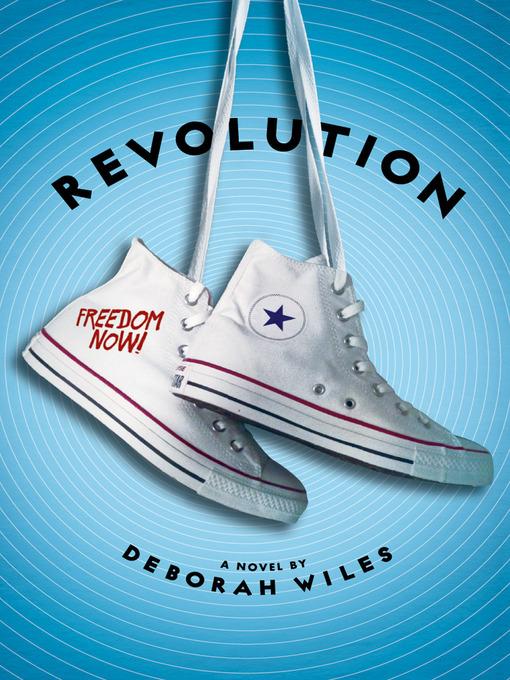
Revolution
Sixties Trilogy, Book 2
سهگانه دهه شصت، کتاب ۲
فرمت کتاب
ebook
تاریخ انتشار
2014
Lexile Score
840
Reading Level
4-5
ATOS
5.2
Interest Level
6-12(MG+)
نویسنده
Deborah Wilesناشر
Scholastic Inc.شابک
9780545634007
کتاب های مرتبط
- اطلاعات
- نقد و بررسی
- دیدگاه کاربران
نقد و بررسی

Starred review from June 23, 2014
This second installment of Wiles's Sixties Trilogy begins during the Freedom Summer of 1964, when hundreds of college students and community organizers arrived to help Mississippi's disenfranchised black citizens overcome voting hurdles erected by local officials. Sunny Fairchild, 12, has seen newspaper stories about these "invaders" and feels an affinity: her household has been taken over by her father's new wife, her children, and her elderly mother. Still, Sunny plans a summer floating in the (whites only) municipal pool, listening to the Beatles, and finding adventures. A chance encounter with Raymond, a talented young black athlete, sets Sunny on a dangerous course, one that exposes the poisonous racism that has her small town on the verge of exploding. As in Countdown (2010), Wiles intersperses Sunny and Raymond's story with historic photos, excerpts from speeches and news stories, and song lyrics that add power and heft to the story. Though the novel is long, it's also accessible and moving, and it will open many eyes to the brutal, not-so-distant past out of which a new standard of fairness and equality arose. Ages 8â12. Agent: Steven Malk, Writers House.

Starred review from April 15, 2014
Freedom Summer in 1964 Mississippi brings both peaceful protest and violence into the lives of two young people. Twelve-year-old Sunny, who's white, cannot accept her new stepmother and stepsiblings. Raymond, "a colored boy," is impatient for integration to open the town's pool, movie theater and baseball field. When trained volunteers for the Council of Federated Organizations--an amalgam of civil rights groups--flood the town to register black voters and establish schools, their work is met with suspicion and bigotry by whites and fear and welcome by blacks. In this companion to Countdown (2010) (with returning character Jo Ellen as one of the volunteers), Wiles once again blends a coming-of-age story with pulsating documentary history. Excerpts from contemporary newspapers, leaflets and brochures brutally expose Ku Klux Klan hatred and detail Student Nonviolent Coordinating Committee instructions on how to react to arrest while on a picket line. Song lyrics from the Beatles, Motown and spirituals provide a cultural context. Copious photographs and subnarratives encapsulate a very wide range of contemporary people and events. But it is Sunny and, more briefly, Raymond who anchor the story as their separate and unequal lives cross paths again and again and culminate in a horrific drive-by shooting. A stepmother to embrace and equal rights are the prizes--even as the conflict in Vietnam escalates. Fifty years later, 1960s words and images still sound and resound in this triumphant middle volume of the author's Sixties Trilogy. (author's note, bibliography) (Historical fiction. 11-15)
COPYRIGHT(2014) Kirkus Reviews, ALL RIGHTS RESERVED.

Starred review from May 1, 2014
Gr 5-8-In Wiles's second installment of the trilogy, readers are offered two alternate viewpoints from very different worlds within the same Greenwood, Mississippi town during the tumultuous Freedom Summer of 1964. Sunny, a 12-year-old white girl, is worried about reports of "invaders" descending upon the sleepy Southern enclave and causing trouble. Meanwhile, Raymond, a black boy from Baptist Town (known among the white citizens as "Colored Town"), is becoming increasingly aware of all the places (especially the public pool and Leflore's theater) he is barred from attending due to Jim Crow laws. As Sunny's worldview is suddenly expanded as she begins to learn more about the sinister underbelly of her seemingly perfect town, her story intersects with Raymond's. Among the cadre of brave young volunteers working to register black Mississippians to vote-a mix of white and black members of various civil rights associations-is Jo Ellen, the older sister from Countdown (Scholastic, 2010). As in the first book, song lyrics, biblical verses, photographs, speeches, essays, and other ephemera immerse readers in one of the most important-and dangerous-moments during the Civil Rights Movement. While Sunny's experiences receive a slightly deeper focus than Raymond's, readers are offered a window into each community and will see both characters change and grow over the course of the summer. Inclusion of primary source materials, including the text of a real and vile pamphlet created by KKK members, does not shy away from the reality and hurtful language used by bigots during this time period. For those looking to extend the story with a full-sensory experience, the author has compiled YouTube clips of each song referenced in the book on a Pinterest board (http: //ow.ly/vBGTc). With elements of family drama and coming-of-age themes that mirror the larger sociopolitical backdrop, Revolution is a book that lingers long after the last page.-Kiera Parrott, School Library Journal
Copyright 2014 School Library Journal, LLC Used with permission.

























دیدگاه کاربران